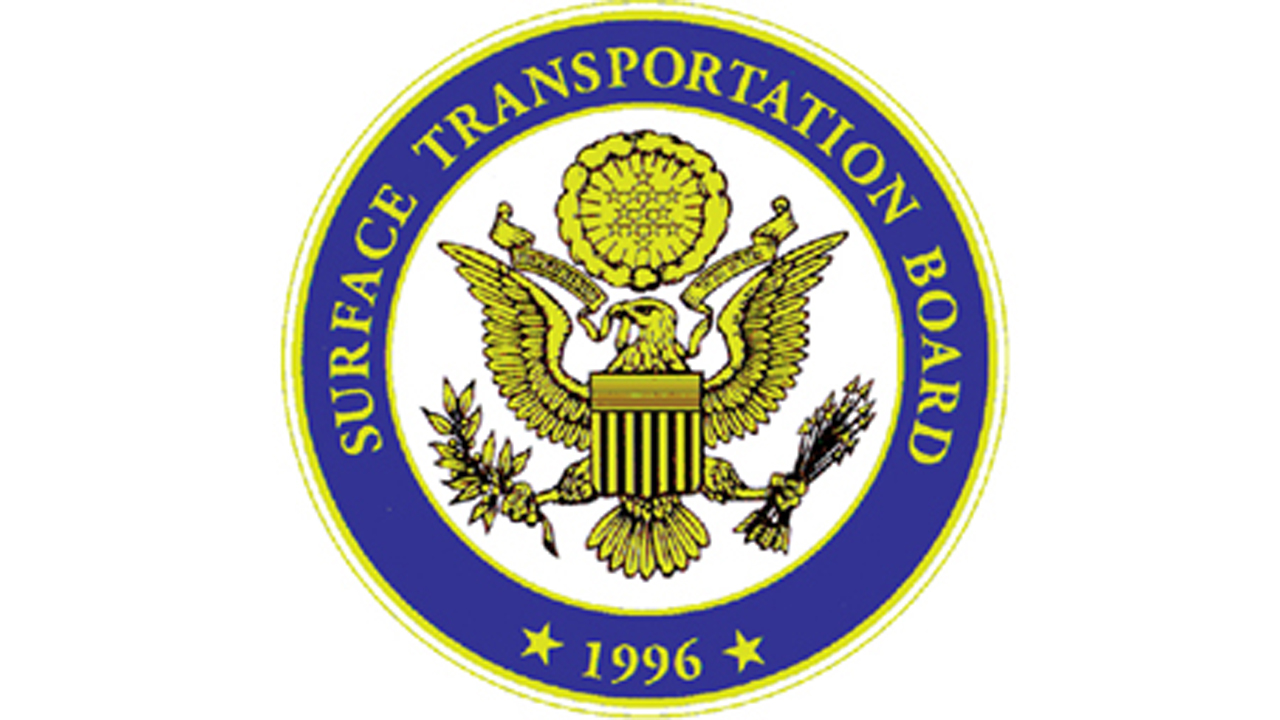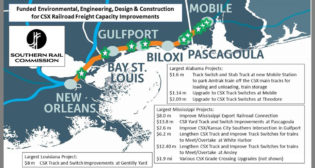
STB Sets Procedural Schedule for Sanimax V. UP
Written by Marybeth Luczak, Executive Editor
The Surface Transportation Board (STB) on Nov. 2 denied Union Pacific’s (UP) motion to dismiss Sanimax USA LLC’s (Sanimax) service case against it and set a procedural schedule for the submission of damages evidence. STB Members Patrick J. Fuchs and Michelle A. Schultz dissented with separate expressions.
Montreal-based Sanimax operates a facility in South St. Paul, Minn., processing animal waste and purifying byproducts for animal feed, pet food, yellow grease, soap and industrial chemicals. On Nov. 6, 2020, it filed a complaint alleging that UP failed to provide adequate rail service in violation of 49 U.S.C. § 11101(a), failed to provide adequate notice of a change in common carrier service terms as required by 49 U.S.C. § 11101(c), and engaged in an unreasonable practice in a matter related to transportation and service in violation of 49 U.S.C. § 10702(2). According to the STB, Sanimax asserted that UP’s reduction in service from five days per week to three days per week and service problems, such as failing to supply railcars on scheduled service days, providing late service, and placing railcars on the incorrect tracks at Sanimax’s facility, are the bases of the alleged statutory violations.
On Nov. 30, 2020, UP filed an answer and a motion to dismiss Sanimax’s complaint on the basis that the commodities at issue are exempt from STB regulation. At the request of the parties, the STB stayed the proceeding to allow them to engage in negotiations. On Feb. 16, 2021, the parties informed the STB that they were unable to reach an agreement, and Sanimax filed a reply to UP’s motion to dismiss, in which it also requested that the Board partially revoke the commodity exemptions to permit the Board to consider the complaint. On Nov. 2, 2021, the STB issued a decision denying UP’s motion to dismiss the complaint, granting Sanimax’s request for partial revocation of the commodity exemptions, and setting a procedural schedule to govern the complaint proceeding.
UP on Nov. 23, 2021, filed a petition for clarification or, in the alternative, reconsideration of the STB decision, seeking “clarification on whether the exemption revocation applies to [UP]’s service provided to Sanimax before November 2, 2021, the date the decision was issued,” according to the Board.
The STB on Feb. 25, 2022, granted UP’s petition in part and clarified that, “pursuant to the partial revocation, the Board will consider whether the issues raised in Sanimax’s complaint warrant relief (including damages) prospectively from November 2, 2021, the date the commodity exemptions were partially revoked,” according to the STB. The Board also stated that “the partial revocation left the parties free to develop a full record regarding prospective liability and relief, which may include arguments based on, and discovery into, events that occurred prior to the date of partial revocation, to the extent relevant.”
The STB reported that pursuant to the parties’ agreed procedural schedule, Sanimax filed opening evidence and arguments on March 2, 2022;, UP filed opening evidence and arguments on April 1, 2022; and Sanimax filed its rebuttal on April 18, 2022. “In its opening brief and evidence, Sanimax argues that ‘the key remaining issue for the Board to decide is the amount of service UP will provide Sanimax going forward,’” according to the STB. “With respect to damages, Sanimax asserts that ‘[i]n order to reduce complexities and keep the focus on the prospective rail service relief that is Sanimax’s primary need by far, Sanimax is holding its damages claim in abeyance at this time.’ Furthermore, if the Board finds that UP violated the statute, ‘Sanimax requests the opportunity to submit evidence as to damages at an appropriate future time and have the Board determine damages for the period beginning November 2, 2021.’”
On May 24, 2022, UP filed a second motion to dismiss. According to the STB, UP argued that “Sanimax presented only a single claim for relief in its opening and rebuttal evidence, which was its request that the Board order UP to provide service to Sanimax five days per week … UP states that, as of May 2022, it increased its service to Sanimax to that level and has committed to that service schedule for a specified period of time … Accordingly, UP argues that Sanimax has received the relief it requested from the Board, and Sanimax’s complaint should be dismissed as moot … With respect to damages, UP asserts that Sanimax waived its damages claim by not presenting damages evidence in its opening or rebuttal … UP contends that the procedural schedule that the parties jointly proposed and the Board adopted did not contemplate bifurcation of damages … Accordingly, UP argues that Sanimax was obligated to present its entire case in chief in its opening evidence and chose to do so in way that focused solely on its request for five-days-per-week service.”
The STB, in a May 24, 2023 decision, directed the parties to file status reports with the number of days per week UP currently provides service to Sanimax; any commitments UP has made regarding future service frequency; and whether the parties have engaged in any further settlement discussions. In its June 7, 2023, report, “UP states that it is currently providing service at the same frequency that it committed to in May 2022 [which is five days per week], that it has not made any further commitments regarding service frequency, but will provide advance notice of any changes to the current service frequency through December 31, 2023, and that there are no plans for formal future settlement discussions,” according to the STB. Sanimax, in its June 7, 2023, report, stated that “the actual service provided by UP has fallen short of the service frequency to which UP committed, that UP has not renewed its commitment to this service schedule, and that the parties have not engaged in any additional settlement discussions,” according to the STB.
The STB in its Nov. 3, 2023, decision (download below) said it was denying UP’s motion to dismiss this proceeding as “moot,” as it finds that both Sanimax’s injunctive relief and damages claims remain unresolved.
According to the STB, “UP argues that Sanimax’s claim for injunctive relief no longer presents an active case or controversy because UP has increased service to Sanimax … Sanimax disagrees, arguing that its injunctive relief claim remains pending because UP has only committed to providing increased service for a limited period of time, after which UP could revert back to three-days-per-week service … In its surreply, UP argues that this argument is unpersuasive, as the Board rejected a similar argument in the past.”
The STB reported that UP’s arguments “fail to demonstrate that Sanimax’s injunctive relief claims are moot … UP’s commitment to provide five-days-per-week service was for a finite and relatively short period of time, after which UP could decide to revert to the same practices that prompted Sanimax’s complaint. Moreover, in its June 7, 2023, report, UP itself stated that it had not made any further commitments regarding service frequency. Accordingly, the Board finds that Sanimax’s injunctive relief claim is not moot. UP also contends that Sanimax’s damages claim is waived because Sanimax did not present damages evidence in its opening or rebuttal … Sanimax, however, argues that it preserved its damages claim in its opening brief by requesting that the Board allow the submission of damages evidence after a liability determination … Furthermore, Sanimax asserts that its approach to damages was practical and necessary since Sanimax could not properly calculate damages until it knew if or when UP would resume adequate service … Sanimax also argues that it submitted initial evidence of damages in its opening evidence.”
Regarding the issue of damages evidence, the STB said it “rejects Sanimax’s argument that it presented such evidence in its opening … Nonetheless, the Board will allow Sanimax to present its damages claim based on the circumstances of this case. Although Sanimax did not present evidence of damages in its March 2, 2022, opening brief, as would usually be required unless the Board declares otherwise, that brief was due less than a week after the Board issued its February 25 Decision clarifying the period during which Sanimax could seek damages. Given that timing, to ensure that Sanimax has a full opportunity to present its case to the Board, and to ensure that the Board has a full record upon which to decide the case, the Board will reopen the record for the limited purpose of allowing Sanimax to supplement its opening and rebuttal briefs with damages arguments and evidence.”
The STB cautioned “the parties to this and other proceedings that the better practice would be for a party seeking to bifurcate a proceeding to file a motion with the Board, not simply to make a passing reference to such a request in a footnote. In the future, the Board may reject such a request on the basis that it was not pursued through a formal motion.”
The STB reported that Sanimax must present by Dec. 18, 2023, its arguments and evidence of damages allegedly incurred subsequent to Nov. 2, 2021—the date the partial revocation took effect. UP will have until Jan. 17, 2024, to respond.
Fuchs and Schultz Dissent
Fuchs wrote, in part, that “allowing Sanimax to submit additional damages evidence now, rather than after the Board makes a finding on liability—is inefficient and forecloses potential cost savings to the parties. Indeed, the structure runs counter to the request from Sanimax itself. In clarifying its belated request to brief damages ‘when the Board determines liability,’ the shipper stated such ‘an approach is efficient and will allow Sanimax to present an accurate picture of damages’ … Both parties have now presented their complete cases on liability, and—if UP were to prevail on this issue—any additional briefing on damages would be completely unnecessary. While it would have been most efficient for the parties to present their complete cases, including damages evidence, in their opening statements, it is no longer possible for the Board to ensure unified presentations in this docket. After considering all the filings submitted under the procedural schedule originally agreed upon by the parties and set by the Board, I find the better course would have been to issue a decision on UP’s liability, if any. I respectfully dissent.”
Schultz wrote, in part: “In a decision served February 25, 2022, the Board stated that it would ‘consider relief, including damages, only from November 2, 2021’ … Pursuant to the parties’ agreed procedural schedule, Sanimax filed its opening statement on March 2, 2022, in which Sanimax did not offer any evidence in support of its claim for damages. The Decision acknowledges as much. Rather, in a footnote, Sanimax attempted to bifurcate this proceeding by holding its damages claim ‘in abeyance’ … If Sanimax wanted to alter the procedural schedule to allow for a bifurcated proceeding, it should have filed a motion to that effect rather than assuming the Board would allow for this procedural change, as bifurcating a proceeding is a decision that can only be made by the Board … Thus, Sanimax should have included its full case in chief in its opening statement, including evidence pertaining to its damages claim. Sanimax failed to do so. For these reasons, I would find that Sanimax has waived this claim … UP contends that its May 2022 commitment to provide five-day-a-week rail service for a certain period of time moots Sanimax’s claim. I agree, as there is no evidence to suggest that Sanimax is not currently receiving that level of service. In addition, even if Sanimax were to prevail, no further relief would be appropriate. …”
Why? Schultz wrote that, “Sanimax has requested ‘indefinite’ five-day-a-week service, ‘subject to the Board’s determination of proper relief’ … When the Board grants prospective relief in fact-intensive situations such as the one presented in this case, the Board does not grant relief in perpetuity, but instead limits it to a reasonable time period.” Additionally, she wrote, “Sanimax bases its claim and request for relief on UP’s history of unreliable service that assertedly necessitated five-day-a-week rail service to its facility—service that Sanimax admits could be performed in three days a week ‘in theory’ but that requires additional days to provide a ‘margin for missed service’ … Thus, Sanimax claims that it needs five-day-a-week rail service not because the nature of its business requires it, nor because its volume supports it. Instead, Sanimax needs additional days of service to compensate for UP’s unreliable service.”
According to Schultz, in “making its decision on the merits, the Board must account for the circumstances surrounding Sanimax’s complaint, which was filed nearly three years ago during a time of deteriorating rail service for many shippers that reached a peak in the spring of 2022. Since that time, however, rail service generally has improved, including service on UP’s network.” Even if UP “were to reduce service in the future from five days a week to three, such a reduction would not necessarily amount to a recurrence of the violation alleged three years ago, as Sanimax asserts,” she wrote. “Any future allegation of inadequate service by Sanimax—e.g., allegations that UP is in violation of its common carrier obligation by reverting back to three-day-a-week service—would require a fact-intensive inquiry by the Board, and a decision finding UP to have violated its common carrier obligation in this proceeding would not necessarily control in a later case … For these reasons I find Sanimax’s complaint to be moot and respectfully dissent.”



